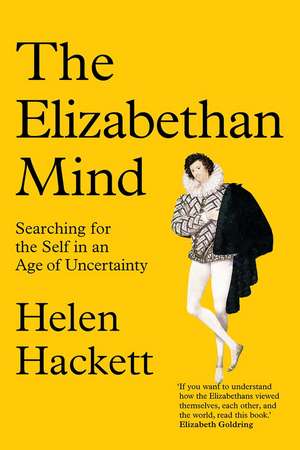The Elizabethan Mind: Searching for the Self in an Age of Uncertainty
Autor Helen Hacketten Limba Engleză Hardback – 12 iul 2022
What is the mind? How does it relate to the body and soul? These questions were as perplexing for the Elizabethans as they are for us today—although their answers were often startlingly different. Shakespeare and his contemporaries believed the mind was governed by the humours and passions, and was susceptible to the Devil’s interference.
In this insightful and wide-ranging account, Helen Hackett explores the intricacies of Elizabethan ideas about the mind. This was a period of turbulence and transition, as persistent medieval theories competed with revived classical ideas and emerging scientific developments. Drawing on a wealth of sources, Hackett sheds new light on works by Shakespeare, Marlowe, Sidney, and Spenser, demonstrating how ideas about the mind shaped new literary and theatrical forms. Looking at their conflicted attitudes to imagination, dreams, and melancholy, Hackett examines how Elizabethans perceived the mind, soul, and self, and how their ideas compare with our own.
Preț: 195.78 lei
Nou
Puncte Express: 294
Preț estimativ în valută:
37.46€ • 39.11$ • 31.00£
37.46€ • 39.11$ • 31.00£
Carte disponibilă
Livrare economică 14-28 martie
Livrare express 27 februarie-05 martie pentru 36.85 lei
Preluare comenzi: 021 569.72.76
Specificații
ISBN-13: 9780300207200
ISBN-10: 0300207204
Pagini: 448
Ilustrații: 23 b-w illus.
Dimensiuni: 156 x 235 x 39 mm
Greutate: 0.7 kg
Editura: Yale University Press
Colecția Yale University Press
ISBN-10: 0300207204
Pagini: 448
Ilustrații: 23 b-w illus.
Dimensiuni: 156 x 235 x 39 mm
Greutate: 0.7 kg
Editura: Yale University Press
Colecția Yale University Press
Recenzii
“An outstanding achievement: broad-ranging, intelligently synthetic and written in unflaggingly lucid prose. . . . Helen Hackett shows us over and again that the inability of the Elizabethans to know themselves as fully as they wanted to mattered to them a great deal. Discomfited though this state of affairs could leave them feeling, it explains why their literature still matters to us today.”—Rhodri Lewis, Times Literary Supplement
“Hackett reads a breathtaking diversity of literature with great sensitivity. . . . The Elizabethan Mind . . . is an impressive achievement.”—P. Kishore Saval, Australian Book Review
“Makes early modern interiority seem accessible, immediate, and exciting, while never losing sight of its distance, strangeness, and mystery.”—Paul Norris, Renaissance and Reformation / Renaissance et Réforme
“Hackett shows that the Elizabethans were as fascinated with the mind-body relationship as people are today . . . and writes clearly on a deep and esoteric subject, complemented by 23 illustrations and numerous literary quotations.”—J. J. Butt, Choice
“Hackett’s extraordinary achievement in The Elizabethan Mind combines learning and empathy as she ranges across cognitive, emotional, spiritual, and physiological approaches. Come for Hamlet, stay for female complaint, Catholic poetics, sonnets, psychomachia, and much more.”—Emma Smith, author of This is Shakespeare
“Hackett has synthesized an extraordinary range of books to illuminate aspects of the Elizabethan mind. She offers excellent readings of familiar works such as Shakespeare’s tragedies as well as little-known gems such as women’s translations of the Psalms. Readers will come away equipped to read Shakespeare and his contemporaries with renewed understanding.”—Jonathan Bate, author of Soul of the Age: The Life, Mind and World of William Shakespeare
“Wonderfully perceptive and illuminating. If you want to understand how the Elizabethans viewed themselves, each other, and the world, read this book.”—Elizabeth Goldring, author of Nicholas Hilliard: Life of an Artist
“Hackett reads a breathtaking diversity of literature with great sensitivity. . . . The Elizabethan Mind . . . is an impressive achievement.”—P. Kishore Saval, Australian Book Review
“Makes early modern interiority seem accessible, immediate, and exciting, while never losing sight of its distance, strangeness, and mystery.”—Paul Norris, Renaissance and Reformation / Renaissance et Réforme
“Hackett shows that the Elizabethans were as fascinated with the mind-body relationship as people are today . . . and writes clearly on a deep and esoteric subject, complemented by 23 illustrations and numerous literary quotations.”—J. J. Butt, Choice
“Hackett’s extraordinary achievement in The Elizabethan Mind combines learning and empathy as she ranges across cognitive, emotional, spiritual, and physiological approaches. Come for Hamlet, stay for female complaint, Catholic poetics, sonnets, psychomachia, and much more.”—Emma Smith, author of This is Shakespeare
“Hackett has synthesized an extraordinary range of books to illuminate aspects of the Elizabethan mind. She offers excellent readings of familiar works such as Shakespeare’s tragedies as well as little-known gems such as women’s translations of the Psalms. Readers will come away equipped to read Shakespeare and his contemporaries with renewed understanding.”—Jonathan Bate, author of Soul of the Age: The Life, Mind and World of William Shakespeare
“Wonderfully perceptive and illuminating. If you want to understand how the Elizabethans viewed themselves, each other, and the world, read this book.”—Elizabeth Goldring, author of Nicholas Hilliard: Life of an Artist
Notă biografică
Helen Hackett is professor of English literature at University College London. An expert on the sixteenth and seventeenth centuries, she is the author of Shakespeare and Elizabeth and A Short History of English Renaissance Drama.
Descriere
The first comprehensive guide to Elizabethan ideas about the mind
